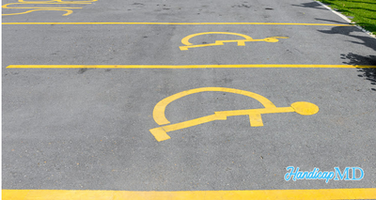
A Guide to Handicap Parking in Massachusetts
Introduction
Welcome to our comprehensive guide on handicap parking in Massachusetts! In this article, we will provide you with all the necessary information, regulations, and guidelines related to handicap parking in the state. Whether you are a resident or a visitor, understanding the rules and procedures regarding handicap parking can help ensure accessibility and convenience for individuals with disabilities. So, let's dive in and explore everything you need to know about disabled parking in Massachusetts.
Understanding Handicap Parking
Handicap parking, also known as accessible parking, is a system designed to provide convenient and safe parking spaces for individuals with disabilities. These designated parking spaces are strategically located to minimize physical barriers and enable easy access to buildings and facilities. Handicap parking plays a crucial role in promoting accessibility, independence, and equal opportunities for people with disabilities.
Benefits of Handicap Parking
Disabled parking offers numerous benefits to individuals with disabilities. Some of the key advantages include:
- Convenience: Parking spaces are situated closer to building entrances, reducing the distance individuals with disabilities need to travel.
- Accessibility: Accessible parking spaces are wider, allowing ample space for individuals to enter and exit vehicles comfortably, especially for those using mobility aids like wheelchairs or walkers.
- Safety: By providing designated parking spaces, handicap parking ensures the safety of individuals with disabilities by minimizing the risks associated with navigating through busy parking lots.
- Equal Access: Handicap parking promotes equal access to public spaces, allowing individuals with disabilities to participate fully in various activities and services.
- Legal Protection: Handicap parking laws protect the rights of individuals with disabilities and enforce penalties for those who misuse or violate these designated spaces.
Who Qualifies for Handicap Parking?
To qualify for parking privileges in Massachusetts, an individual must have a qualifying disability that substantially impairs their mobility. Common qualifying conditions include:
- Mobility impairments affecting walking ability
- Severe respiratory conditions
- Visual impairments
- Cardiac conditions
- Neurological disorders
- Arthritis or joint-related conditions
To determine eligibility, individuals must consult with a licensed healthcare professional, such as a physician or nurse practitioner, who can evaluate their condition and provide appropriate documentation.
Handicap Parking Spaces
Handicap parking spaces are specially designated parking spots reserved for individuals with disabilities. These spaces are easily identifiable by the international symbol of accessibility—a blue and white sign featuring a wheelchair symbol.
In Massachusetts, these parking spaces are strategically located in various parking lots, including public facilities, shopping centers, office complexes, and residential areas. The close proximity to building entrances ensures easy access for individuals with disabilities, minimizing the distance they need to travel.
It is essential for all drivers to respect and adhere to the designated parking spaces to maintain accessibility for those who need them.
Accessible Parking Requirements
To ensure the accessibility of handicap parking spaces, certain requirements and guidelines are in place. These requirements include:
Size: Parking spaces must be a minimum of 8 feet wide. This width allows individuals with disabilities to comfortably maneuver in and out of their vehicles, especially those using mobility aids.
Signage: Each parking space must be clearly marked with the international symbol of accessibility and the phrase "Reserved Parking" or a similar designation. The signage should be visible from all angles and properly maintained.
Accessible Routes: Accessible routes connecting parking spaces to building entrances must be provided. These routes should be free from obstructions, level, and have appropriate curb ramps or sloped surfaces to accommodate individuals with mobility devices.
Van-Accessible Spaces: In parking lots with more than one parking space, at least one space should be designated as "van-accessible." These spaces have additional width and are designed to accommodate accessible vans equipped with ramps or lifts.
Proximity to Entrances: Parking spaces should be located as close as possible to building entrances. The distance between the accessible parking spaces and the entrance should be minimized to facilitate easy access for individuals with disabilities.
By adhering to these requirements, parking lot owners and managers ensure that disabled parking spaces meet the necessary accessibility standards, promoting inclusivity and convenience for individuals with disabilities.
Parking Violations and Penalties
Misuse or violation of disabled parking spaces is a serious offense in Massachusetts and can result in penalties and fines. Some common violations include:
- Parking in a disabled space without a valid disabled parking permit or license plate.
- Altering, forging, or using counterfeit disabled parking permits.
- Using someone else's disabled parking permit without authorization.
- Parking in a disabled space while displaying an expired or invalid disabled parking permit.
The penalties for disabled parking violations vary depending on the offense. Violators may face fines, vehicle towing, and even suspension of driving privileges.
It is crucial to respect and adhere to the designated parking spaces, ensuring accessibility for those who genuinely require them.
Enforcement of Handicap Parking Laws
Disabled parking laws in Massachusetts are enforced by various authorities to ensure compliance and accessibility. These authorities include:
Massachusetts Registry of Motor Vehicles (RMV): The RMV is responsible for issuing handicap parking permits and maintaining the associated records. They oversee the application process, permit issuance, and renewal procedures.
Local Law Enforcement: Local police departments have the authority to enforce disabled parking laws and regulations. They monitor parking lots, issue citations for violations, and ensure compliance with parking requirements.
Parking Enforcement Officers: Parking enforcement officers, employed by municipal authorities, are responsible for monitoring and enforcing parking regulations, including disabled parking violations. They patrol parking areas, issue citations, and ensure the proper use of disabled parking spaces.
Property Owners and Managers: Property owners and managers play a vital role in enforcing disabled parking rules on their premises. They can collaborate with local authorities to monitor parking spaces, report violations, and take appropriate actions against offenders.
The combined efforts of these authorities help maintain the integrity of disabled parking spaces and ensure accessibility for individuals with disabilities.
Handicap Parking and Public Transportation
Public transportation plays a crucial role in ensuring accessibility and convenience for individuals with disabilities. In Massachusetts, the Massachusetts Bay Transportation Authority (MBTA) operates an extensive network of accessible buses, trains, and subway stations.
The MBTA provides several accommodations for individuals with disabilities, including:
Accessible Buses: The MBTA operates a fleet of low-floor, accessible buses equipped with ramps or lifts to facilitate boarding and alighting for passengers with mobility devices.
Accessible Stations: Many MBTA subway stations are equipped with elevators or ramps to provide barrier-free access for individuals with disabilities. These stations also have designated disabled parking spaces nearby to ensure convenient access to public transportation.
The RIDE: The RIDE is a specialized transportation service provided by the MBTA for individuals who are unable to use regular fixed-route public transportation due to a disability. The RIDE offers door-to-door service and accommodates individuals with mobility impairments.
For more information on accessible public transportation services and schedules, individuals can visit the MBTA's official website or contact their customer service helpline.
Handicap Parking and Private Property
In addition to public spaces, these parking regulations also apply to private property. Property owners, including businesses and establishments, have a responsibility to provide accessible parking options for individuals with disabilities.
Private property owners should consider the following guidelines when providing handicap parking spaces:
Compliance with ADA: Private properties must comply with the accessibility requirements outlined by the Americans with Disabilities Act (ADA). This includes providing the appropriate number of parking spaces based on the size of the parking lot.
Signage and Markings: Private property owners should install proper signage and pavement markings to designate these parking spaces. The signage should meet the standards set by the ADA and be visible and legible.
Maintenance: Property owners must ensure the proper maintenance of these parking spaces, including keeping the spaces clear of obstructions, maintaining clear signage, and providing accessible routes to building entrances.
Unauthorized Use: Property owners have the right to enforce handicap parking regulations on their premises. They can take appropriate actions against individuals who violate these regulations, including towing vehicles or imposing fines.
By adhering to these guidelines, private property owners contribute to creating an inclusive environment that accommodates individuals with disabilities.
Handicap Parking and Temporary Disabilities
Handicap parking is not limited to individuals with permanent disabilities. Temporary disabilities, such as injuries or medical conditions that affect mobility for a limited duration, also qualify individuals for parking privileges.
If you have a temporary disability and require handicap parking, you can apply for a temporary parking permit in Massachusetts. The process for obtaining a temporary permit is similar to that of a permanent permit, but the duration of the permit is shorter.
Temporary parking permits are valid for a maximum of five months. These permits allow individuals with temporary disabilities to park in designated handicap parking spaces and enjoy the accessibility benefits they provide.
It is essential to note that temporary parking permits are issued based on the duration of the disability and the recommendations of a licensed healthcare professional. Once the temporary disability resolves, the permit must be returned, and individuals should discontinue using handicap parking spaces unless they qualify for a permanent permit.
Frequently Asked Questions (FAQs)
Can I use my out-of-state disabled parking permit in Massachusetts?
Yes, Massachusetts recognizes out-of-state disabled parking permits and allows their use in the state. However, it is crucial to adhere to Massachusetts disabled parking laws and regulations while utilizing these permits.
Can I use someone else's disabled parking permit if they are not with me?
No, it is illegal to use someone else's parking permit without authorization. Parking permits are issued for the exclusive use of the individual to whom they are issued. Using someone else's permit can result in penalties and fines.
Are disabled parking spaces free to use?
These parking spaces do not exempt individuals from paying parking fees or meter charges. However, some municipalities may offer certain parking benefits or reduced rates for individuals with valid handicap parking permits. It is advisable to check with the local authorities for specific regulations and benefits.
What should I do if I see someone misusing a disabled parking space?
If you witness someone misusing a parking space, you can report the incident to the local authorities or the property owner/manager if it occurs on private property. Provide them with as much information as possible, such as the vehicle's license plate number and location.
Can I park in a disabled parking space without a disabled parking permit if it's just for a few minutes?
No, these parking spaces are strictly reserved for individuals with valid parking permits. Even if it is for a short duration, it is illegal to use these spaces without the appropriate permit.
Can I use my disabled parking permit in another vehicle?
Yes, parking permits are transferable between vehicles as long as the permit holder is present. The permit should be properly displayed in the vehicle being used, ensuring it is visible to parking enforcement officers.
Conclusion
A Guide to Handicap Parking in Massachusetts provides valuable information on the eligibility criteria, application process, types of permits, and the importance of adhering to handicap parking regulations. By following the guidelines outlined in this guide, individuals with disabilities can obtain the necessary permits to access these parking spaces conveniently.
Handicap parking spaces play a vital role in ensuring equal access and convenience for individuals with disabilities. It is essential for all drivers to respect and comply with parking regulations to maintain inclusivity and accessibility.
Remember, disabled parking is not just a legal requirement but also a matter of empathy and consideration for those who genuinely need these spaces. Let's work together to create an inclusive and accessible environment for all.
.png)






